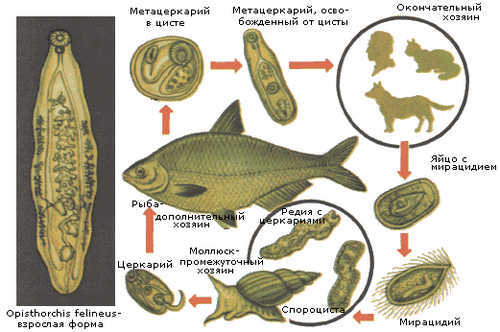To self diagnose giardiasis does not work, but for some symptoms the person may guess that his body is settled harmful microbes. In any case it requires treatment to the doctor to conduct the study and appointments for proper treatment.
Life cycle of Giardia
In the human body the bacteria enter through the mouth, so infected when personal hygiene and safety measures is practically impossible. The esophagus microorganisms moving to the stomach, and thence into the intestine, where they begin dividing and reproduction. By this time, the person feels unwell and loss of strength, especially if it’s a child’s immune system is weaker.
Giardia live in the villi of the mucous membrane and feed on the nutrients, which arrive in the intestine. This is a favorable environment for their life and reproduction. During this period, changing the phase of activity, they become passive bacteria, and before entering the large intestine and grows a protective shell. After the outputs from the body the parasites then move into an active phase and is ready to further contamination of living organisms.
The danger of these harmful bacteria in that they have a strong vitality, tolerate extremes of high and low temperatures, remain in a preserved state for up to one year. And to determine in advance, whether they live in a particular product, it is impossible.
The emergence of microscopic bacteria in the human body – the process is frequent and widespread, especially in areas where there is poor sanitation and germs are transmitted unhindered. When released into the digestive system of microorganisms such as Giardia, giardiasis is caused. In the first stage, it goes unnoticed, but over time will manifest itself, especially in people with weakened immune systems, and therefore requires a comprehensive treatment. Long-term presence of bacteria in the intestine inhibits the digestive tract and affects the overall health of the person.
Way infections Giardia
Giardiasis occurs in the body after the bacteria enter inside through the mouth.
Situations where this happens quite a lot:
- the use of dirty vegetables and fruits;
- drinking contaminated water;
- meals with unwashed hands;
- bacteria also enter the body through saliva by kissing;
- use some personal hygiene items with an infected person;
- swimming in a dirty pond and ingress of contaminated water into the body;
- bad habits – biting the tip of a pen or pencil, nail biting;
- communication with infected animals, games, hugs, touch.
On the question of whether Giardia is transmitted by kissing, there is a clear and unequivocal answer – Yes, if a person carries the bacteria in itself. Once in the body, they for a long time did not occur, and only settled down in the intestines, they give the symptoms and signs of their presence.
About a third of the population are carriers, because giardiasis is spread from person to person easily and quickly. With a strong immune system and lack of other diseases the bacteria can’t bother humans. But children often adults prone to impaired health and well-being due to the propagation of Giardia inside of the body. Ignoring the problems and the lack of any action causes the transition to the chronic stage.

Symptoms, diagnosis and treatment of giardiasis
To notice the disease will take on deterioration of health, which is manifested by these signs:
- painful sensations in the stomach;
- nausea;
- violations of the chair, upset stomach;
- flatulence, which is the reason for the development of food allergies;
- weakness, sleep disturbance;
- poor appetite and weight loss.
The child may also suffer from fever. Because these symptoms accompany many gastrointestinal disorders, only testing will help to give a precise answer. The most commonly used method is coproscopy, give up also blood, urine and feces.
If after the detection of Giardia nothing to do, the body adapts to the presence of bacteria, learning to function with them. Symptoms can appear from time to time, giving themselves felt in numerous ways, for example by failure of the stomach. However, people rarely respond to such signs, going to the doctor unless absolutely necessary. Treatment of giardiasis involves admission enterosorbents and antiparasitic drugs, following a special diet, intestinal cleansing, strengthening the immune system.

Prophylaxis of giardiasis
Preventive measures prevent the ingestion of harmful bacteria, because their observance will help to avoid problems. The most effective methods are the following:
- always wash and process any products that are intended to be used;
- regularly as necessary to wash hands with soap and water, but especially before eating;
- don’t swim in questionable water or dirty lakes;
- only use the individual means of hygiene at home;
- to undergo examinations at least once a year in order to replace any health changes.
Simple rules and measures of prevention could save you from serious problems, so do not neglect them. This is especially true of literacy education for children, and giving them the rules of personal hygiene, because the child repeats for adults.



